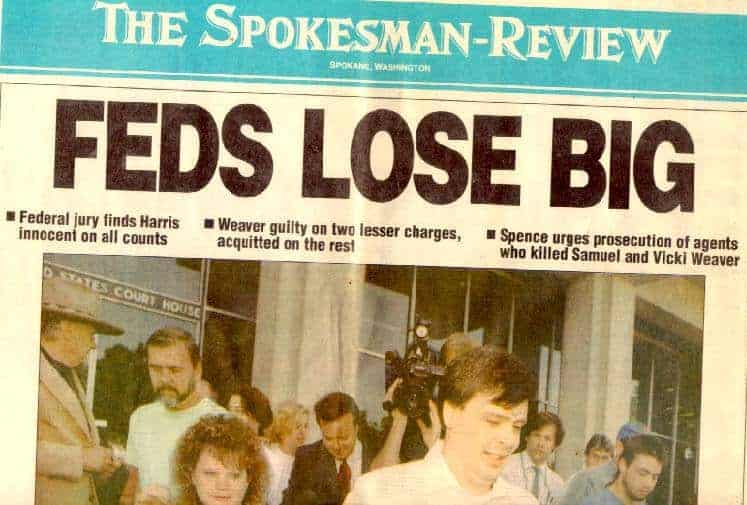
26 Feb THE INCIDENT AT RUBY RIDGE, Part 5
THE INCIDENT AT RUBY RIDGE
PART FIVE – THE JURY DELIBERATES AND THE AFTERMATH
Jury deliberations began on Wednesday, June 16, sequestered in a windowless room with institutional-green walls. Television news trucks filled the parking lots, and reporters invaded Boise’s local establishments, sitting on pins and needles waiting for word.
Thirteen days later, on June 29, a juror-suffering from post-traumatic stress disorder and a chronic heart condition-could not continue and was replaced by an alternate. The jury, thirteen days into their deliberations had to start all over. The jurors soon asked to hear the entrapment evidence again.
Finally on July 8th, the jury sent word they had reached a verdict.
The jury room was packed, and silent as the verdicts were read. Randy Weaver and Kevin Harris, overcome with emotion embraced each other as the the Court announced the findings. Weaver was acquitted of all charges except the failure to appear and for committing a crime while on bail release. Kevin Harris was acquitted of all charges; when a deputy said he’d have to take the young man back to jail for processing, his attorney, Nevin, told the deputy, “The hell you will. He’s going out the front door with me.” He left court that day holding his mother’s hand.
Weaver’s conviction was bittersweet, although he had been cleared of any of the major crimes, he would have to return to jail, most likely to be out by fall. Ultimately Judge Lodge dismissed the second conviction, because it had been proven that Weaver did not commit any crime during the siege, and Lodge sentenced him to between eighteen and twenty four months for the failure to appear.
Since Weaver had already served fourteen months, he would be released by Christmas, and in December 1993 he was finally freed. Upon his release he flew to Iowa to be with his girls and spent Christmas with them.
THE AFTERMATH
In August of 1994, Randy Weaver filed a lawsuit for the wrongful deaths of Sammy and Vicki Weaver. The case settled before trial for $3.2 million dollars in August of 1995. The government, however, refused to acknowledge any wrongdoing. Kevin Harris also filed a lawsuit and it settled for $438,000.
Gerry Spence, who had represented Randy Weaver free of charge, was granted exclusive rights, by Weaver, to his story. Spence added a chapter to an earlier book, From Freedom To Slavery (an excellent read, by the way), and has worked since the conclusion of the trial to change public opinion about his client. Despite his acquittal many Americans still believe he is responsible for the death of a U.S. Marshal.
Following Weaver’s trial, the U.S. Senate appointed a special commission to investigate the “incident” at Ruby Ridge. A committee drafted a five-hundred-page report documenting the wrongdoing of the government agent involved in the siege. Following the investigation, Danny Coulson, the founder of the Hostage Rescue Team, was given a letter of censure; Michael Kahoe, who had been involved in researching the rules of engagement, was censured and suspended for fifteen days; Richard Rogers, head of the Hostage Rescue Team, was censured and suspended for ten days.
Kahoe later pled guilty to a charge of obstructing justice for his destruction of an FBI report critical of the Ruby Ridge siege.
Larry Potts, the FBI man who allegedly approved the rules of engagement without his boss’ knowledge, was censured, although a later investigation concluded that there was insufficient evidence to prove he had approved the revised rules. Eugene Glen, Ruby Ridge field commander, was censured and suspended for fifteen days; and Lon Horiuchi, the sniper who killed Vicki Weaver, received no punishment.
The Senate Judiciary subcommittee on terrorism criticized the Hostage Rescue Team, Marshals, and BATF for their roles in the incident. The subcommittee also found that sniper Lon Horiuchi’s actions were illegal and violated Vicki Weaver’s civil rights.
Idaho prosecutors acted and charged Horiuchi with involuntary manslaughter. Horiuchi moved for dismissal, arguing that because he was a federal agent who killed in the line of duty he was immune from prosecution. The federal appeals court rejected his argument and ordered him to stand trial. However, in the meantime a new prosecutor was elected and for reasons never made public fired the special prosecutor in charge and dismissed the case against Horiuchi. Horiuchi never spent a day in jail, didn’t lose his job, and never lost a day’s pay.
FINAL WORDS
The opinions here are solely the thoughts of Brecken A. Wagner:
First and foremost Gerry Spence was 100% correct this was a watershed case. It has been over twenty years since Vicki and Sammy Weaver and Marshal Degan lost their lives on that mountain in Idaho, but the audacity of this tragedy will live forever in infamy. This was a perfect cocktail of the over reaction of the American public to things they do not understand, the strong will of one family, the embellishment of an unaccountable media, and the overwhelming firepower that the government can unleash upon its own people.
Randy Weaver was made into a pariah by the media, and then the government used his circumstances to play war on its own people. The use of force and rules of engagement that were so seminal in this case haunt us still today in the streets of other small towns like Ferguson.
Randy Weaver was not going to come off that mountain, because he believed, and arguably so, that his government had singled him out to be an example to the rest of the populace. He believed that ultimately his government was going to kill him to keep the rest of us in line, that he was the non-conformist that should be broken.
The agents at the bottom of that mountain believed that Randy Weaver was a “bad guy” and his death would be a victory rather than a tragedy. What resulted was an us vs. them mentality that led to an avoidable tragedy.
I cannot help but remember the words that Gerry Spence wrote to his friend Alan Hirshfield, “for the ultimate enemy of any people is not the angry hate groups that fester within, but a Government itself that has lost its respect for the individual.” When was that respect lost at Ruby Ridge? Was it when the undercover agent coaxed Randy into committing a crime? Was it when the government refused to recognize the failure of their case and dismiss it? Was it when the agents surrounded that hill. Was it when the government decided that they should shoot the Weaver’s dog? Was it when Sammy was shot? Was it the government changed the rules of engagement to bring about the death of every adult on that hill? Was it when Lon Horiuchi put a high powered bullet through the face of Vicki Weaver? Was it when the agents teased the Weavers over the loud speakers about Vicki? Was it when the agencies stonewalled and in some cases either refused to turn over, or destroyed evidence that would have been helpful to the defense at trial. Was it when the government, after the trial and to this day, still refuse to admit any wrongdoing?
Finally, I cannot conclude without talking about Gerry Spence. Attorneys tend to be rather arrogant people, and consider themselves to be the best. Hell, I do myself, if you have any doubt about whether I think I’m a good attorney just ask I’ll tell you. But, there are those among us that walk a little taller, and carry a bigger stick. Gerry Spence is one of those people. The reason I posted his entire closing argument is because it is so important. Gerry Spence spoke from his heart, he spoke about his own shortcomings, his fears, and ultimately his love for his client. I think the incorrect, but natural assumption is that Mr. Spence is a master attorney and these things that he said were plainly just for show. That he did this to gain sympathy for his client and persuade a jury to do something that they shouldn’t have. However, we have evidence that that is not the case.
Gerry Spence has dedicated years to the defense of Randy Weaver after the trial, not because he wanted to win a case, but because he did feel a love for his client. His words in that closing argument are so powerful and raw because they are actually true. Spence’s defense of Randy Weaver is an example of a man who did more than believe in his client, but believed in the greater good of what he was defending. He truly believed that he was defending every single American against a rising tide a tyranny, and although he feared he was not up to the job, his heroism left an indelible mark on history. I thank him for defending me.




No Comments